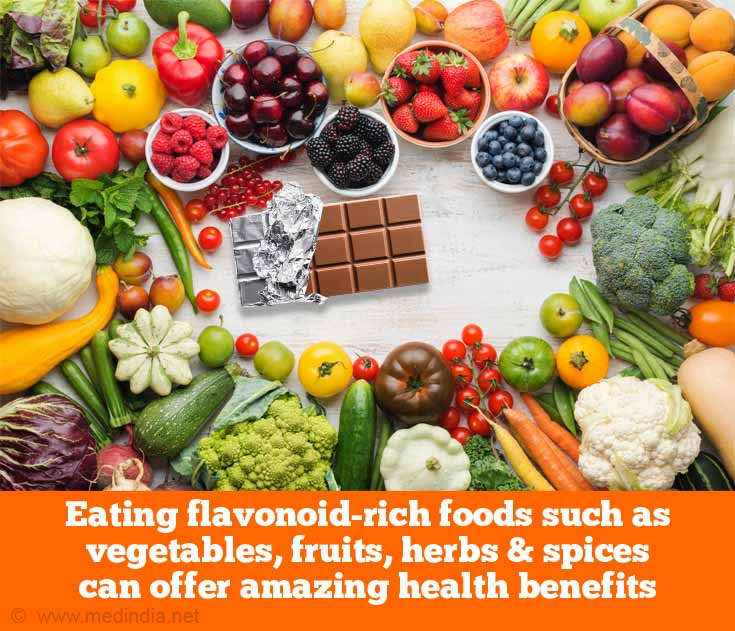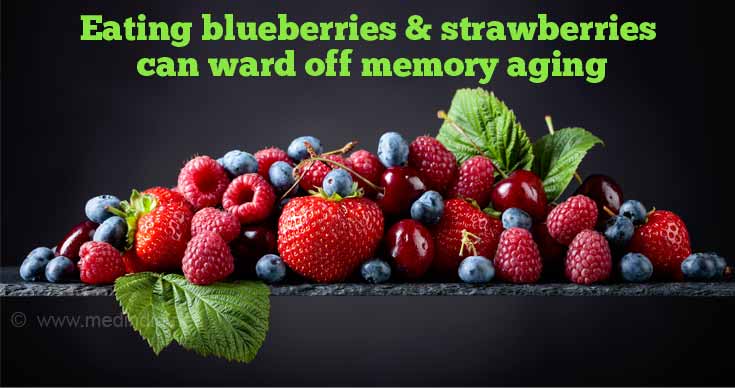- Flavonoids - (https://lpi.oregonstate.edu/mic/dietary-factors/phytochemicals/flavonoids#intro)
- Celery, artichokes contain flavonoids that kill human pancreatic cancer cells - (https://research.aces.illinois.edu/content/celery-artichokes-contain-flavonoids-kill-human-pancreatic-cancer-cells)
- Extracted or synthesized soybean isoflavones reduce menopausal hot flash frequency and severity: systematic review and meta-analysis of randomized controlled trials. - - (http://www.ncbi.nlm.nih.gov/pubmed/22433977)
- Anti-Porphyromonas gingivalis and Anti-Inflammatory Activities of A-Type Cranberry Proanthocyanidins - (https://aac.asm.org/content/54/5/1778.full)
- Dietary intakes of berries and flavonoids in relation to cognitive decline. - (http://www.ncbi.nlm.nih.gov/pubmed/22535616)
What are Flavonoids?
Flavonoids are polyphenolic plant pigments widely present in vegetables, fruits, herbs and spices. Lesser known than vitamin C and E, these are a group of antioxidants that are lately receiving a lot of attention for their health benefits.
The bioavailability of flavonoids is relatively low for two reasons. One, their absorption from the digestive tract is usually limited. Secondly, these are very quickly eliminated from the body.

The most bioavailable group of flavonoids is the isoflavones that contain the soy flavonoid called genistein.
Health Benefits of Flavonoids
Flavonoids are especially known for their antioxidant activities, which play a significant role in cardiovascular health and in the prevention of cancer. Other than fighting free radicals, they are also known for their antihistamine, antimicrobial, memory enhancing and even mood-boosting properties.
Flavonoids May have Potential for Killing Cancer Cells - A study from the University of Illinois showed that celery, artichokes, and herbs, especially Mexican oregano, contain flavonoids that killed human pancreatic cancer cells under lab conditions. The flavonoids act by inhibiting an important enzyme. However, the research team said that the trick seemed to be in using the flavonoids as a pre-treatment instead of using them and the chemotherapeutic drug simultaneously, since ‘flavonoids can act as antioxidants and taking antioxidant supplements on the same day as chemotherapeutic drugs may negate the effect of those drugs’.
Flavonoids have Cardiovascular Benefits - A review study published in the American Journal of Clinical Nutrition confirmed earlier researches on benefits of chocolate flavonoids on cardiovascular health. The researchers found that chocolate or cocoa reduced blood pressure and had significant effects on LDL and HDL cholesterol.

Flavonoids are Beneficial in Controlling Diabetes - The study also found that insulin resistance was improved by chocolate or cocoa due to significant reductions in serum insulin.
Isoflavones may Ease Menopausal Symptoms - Soybean isoflavones have been found to reduce hot flash frequency in perimenopausal and postmenopausal women, according to a study by researchers at National Institute of Health and Nutrition, Tokyo, Japan.
Isoflavones may Reduce the Risk of Osteoporosis - Scientists have also found that soy isoflavones may prevent postmenopausal osteoporosis and improve bone strength, thus decreasing the risk of fracture in menopausal women by significantly increased bone mineral density.
Proanthocyanidins Reduce the Destruction of Collagen - Grape seed proanthocyanidin extract (GSPE) acting as an antioxidant has a therapeutic effect on collagen-induced arthritis, say the researchers at The Rheumatism Research Center, The Catholic University of Korea, Seoul. They experimented on lab animals and found that GSPE significantly reduced hydrogen peroxide production that destroyed collagen. The researchers also suggested that GSPE may be beneficial for the treatment of chronic autoimmune inflammation, which is commonly observed in rheumatoid arthritis.
Proanthocyanidins may Prevent Gum Disease - The anti-inflammatory activity of cranberry proanthocyanidins can effectively inhibit the invasiveness of the gum disease-causing bacteria. Canadian researchers are of the opinion that proanthocyanidins can not only prevent gum diseases but may be used to treat the disease as well.
Flavonoids Improve Cognition in Older Adults - The flavonoid antioxidants, especially anthocyanidins, have shown to improve cognition in experimental studies. Greater intakes of blueberries and strawberries were associated with slower rates of cognitive decline, according to Harvard researchers. They also pointed out that ‘berry intake appears to delay cognitive aging by up to 2.5 years’. Incidentally, flavonoids also reduce the slowing of body movements, fatigue, irritability, and depression, all associated with free radical damage.

Flavonoid Food Sources
All fruits and vegetables contain one or the other flavonoids to a certain degree.
| Flavonoid | Common Food Sources |
| Anthocyanidins | Red, blue, and purple berries; red and purple grapes; red wine |
| Flavanols 1. Catechins 2. Theaflavins 3. Proanthocyanidins | 1. Teas (particularly green and white), chocolate, grapes, berries, apples |
| Flavanones | Citrus fruits and juices, (oranges, grapefruits, lemons) |
| Flavonols | Onions, scallions, kale, broccoli, apples, berries, teas |
| Flavones | Parsley, thyme, celery, hot peppers |
| Isoflavones | Soybeans, soy foods, legumes |
[Source: http://lpi.oregonstate.edu/infocenter/phytochemicals/flavonoids/]
Another classification of flavonoid foods is based on their flavonoid content.
- High flavonoid content (50mg / 100g food) - examples: onion, kale, green bean, broccoli, celery, cranberry, orange juice
- Medium flavonoid content (1 to 5mg / 100g food) - examples: tomato, bell pepper, strawberry, broad bean, apple, grape, red wine, tea, tomato juice
- Low flavonoid content (under 1mg /100g food) - examples: cabbage, carrot, mushroom, pea, spinach, peach, white wine, coffee
[Source: http://flavo.vtt.fi/flavonoidsources.htm]
Flavonoids Side Effects
Interestingly, there is no evidence of side effects associated with dietary intake of flavonoids. The reason could be attributed to their low bioavailability, that is, poor absorption and quick elimination.
However, flavonoids in the supplement form do have side effects, and sometimes severe ones. For example, they can cause nausea, headache, or tingling of the extremities in some people when taken in doses of 1000mg per day. Similarly, a study showed that tea extracts supplement can cause liver toxicity in some cancer patients.
It is best to avoid flavonoid supplements during






